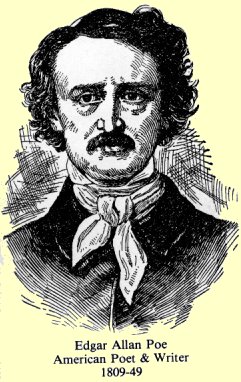Poe's Cosmology
Today, gothic cosmology. The University of Houston's College of Engineering presents this series about the machines that make our civilization run, and the people whose ingenuity created them.
 You and I tend to know Edgar Allan Poe through movies and TV better than we do through his actual words. Murders in the Rue Morgue, The Fall of the House of Usher, The Pit and the Pendulum -- they all devolve into cinematic images. Even The Raven is a more cinematic than literary experience for most of us. We don't know Poe as well as we might. And that's too bad.
You and I tend to know Edgar Allan Poe through movies and TV better than we do through his actual words. Murders in the Rue Morgue, The Fall of the House of Usher, The Pit and the Pendulum -- they all devolve into cinematic images. Even The Raven is a more cinematic than literary experience for most of us. We don't know Poe as well as we might. And that's too bad.
Poe was a true polymath with a vast breadth of knowledge that included a deep understanding of science. One of his least known books was titled Eureka: A Prose Poem. It was published in 1848, the year before he died at the age of forty. Poe is not the least bit timid in this small treatise. He says,
I design to speak of the Physical, Metaphysical and Mathematical -- of the Material and Spiritual Universe: -- of its Essence, its Origin, its Creation, its Present Condition and its Destiny.
That's pretty brazen! Still, physicists and philosophers deal with all these issues. They just don't often put them all on the same plate.
Poe starts out by lampooning science for trying to base itself entirely on data. He insists that scientific understanding always comes through an intuitive leap of the mind. The Romantic poets just before him had said the same thing -- that for two hundred years, scientists had been trying to extract truth from endless observations. Scientists were just about to see the sense of what Poe and the Romantics were saying. And science was just about to make its next great leap forward.
Poe then offers a masterful synthesis of what we knew about the cosmos. He talks about Laplace's work and about the role of the speed of light. It's a brilliant summary, not only of the reach and structure of the universe, but its shape as well. All the while, he doggedly insists on seeing the cosmos subjectively -- for the objectification of science has been its undoing.
Finally, he makes deductions. Fifty-seven years before Einstein's first paper on relativity, he suggests that matter is merely condensed energy. He anticipates black holes. He suggests that the universe is finite but endless. What that meant would become clear only after we had non-Euclidean geometries.
In 1941, a Poe biographer, needing help with Eureka, went to the great Einstein interpreter, Sir Arthur Eddington. Eddington credited Poe with a cutting-edge understanding of contemporary science. He also noted that intelligent guesswork has to yield a few lucky hits. But still more hits have emerged since then.
Poe concludes that the universe will be annihilated as its particles seek out unity with one another. He seems at odds with the more positive transcendentalists, like Emerson. Yet this is precisely where our oscillating universe theory takes us. As all particles collapse into one and identity dies, Poe sees us becoming a part of the one great intelligence -- a part of God. And Poe, at last, turns out to be not so Gothic, not so morbid, after all.
I'm John Lienhard, at the University of Houston, where we're interested in the way inventive minds work.
(Theme music)
Poe, E. A. Eureka: A Prose Poem. Kobenhavn: Green Integer, 1997 (originally published in 1848).
Quinn, A. H., S. Edgar Allan Poe: A Critical Biography. Baltimore, MD: The Johns Hopkins University Press, 1998 (originally published in 1941). Chapter XVII, Eureka.
For an interesting technical commentary on Eureka, see: http://www.poedecoder.com/essays/eureka/
For a the text of Eureka see: http://www.eapoe.org/works/essays/eureka1.htm
For more on Poe and science, see Episode 1090. I am grateful to Roberta Weldon, UH English Department, for counsel on this episode.